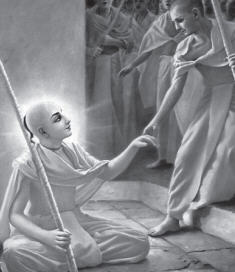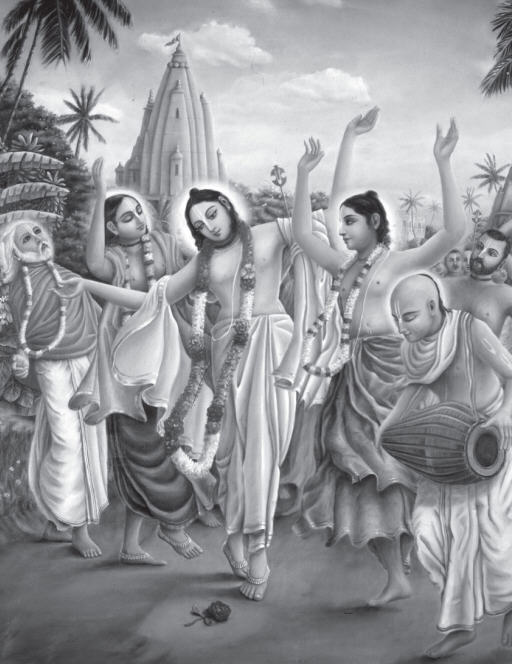Lord Caitanya convinced a group of religious scholars that beyond all speculation,
three-and only three principles emerge as the eternal truths of religion.
three-and only three principles emerge as the eternal truths of religion.

Five hundred years ago, Sri Caitanya Mahaprabhu, who Vedic scriptures tell us is Krgla, the Supreme Personality of Godhead, addressed a gathering of philosopher scholars in the Indian city of Varanasi. This place, now called Benares, has long been known as a center for philosophers who hold that the Absolute Truth is impersonal.
Lord Caitanya had been challenged by these philosophers, and He agreed to attend their meeting to discuss doctrine. He pointed out that their founder, Sankara, had taken the direct mean ing of the Vedanta scripture and changed it to suit his own philosophy. Lord Caitanya's presentation was very strong and learned: the impersonalists were moved and convinced.
Their leader said, "You have pointed out our wrong in terpretation of Vedanta. Would you please explain to us Your understanding of the actual meaning of Vedanta?"
Lord Caitanya then summarized the philosophy in this way:
sambandha, abhidheya,
prayojana nama
ei tina artha sarva-sure
paryavasana
"One's relationship with the Supreme Personality of Godhead, activities in terms of that relationship, and the ultimate goal of life [to develop love of God] these three subjects are explained in every code of the Vedanta-satra, for they form the culmination of the entire Vedanta philosophy." (Ce. Adi 7.146)
These three principles-to come to know the Supreme Being, to learn how to serve Him, and to develop love for Him-are central to every religion. As presented by Lord Caitanya, they are simple, nondogmatic. and comprehensive. Unfortunately, most people will not take t he first step, which is to inquire about their relationship with the Supreme.
The philosopher Sankara said that in observing people, we see the young playing sports and games, the grownups running after sex and money, and the elderly reminiscing. No one is ser iously inquiring into the Absolute Truth. Although the materialist claims that no truth exists beyond what we can perceive with our senses, questions about the Absolute Truth must arise in the heart of a real human being. Such a person is not satisfied with the proposition that the universe and all the arrangements in it have come about by accident. He wants to know something beyond just living and dying in this temporary world. As h e sees the suffering brought on by material conditions, he is impelled to ask. "Is there liberation from this? Do I have to suffer? Do I have to die?" When a person has the inclination to inquire whether there is knowledge or a consciousness higher than material consciousness, if he is fortunate he will go to qualified teachers for answers.
STEP ONE-AWAKENING
Not everyone is qualified to give us information about the Absolute Truth, yet a great wealth of information is ava ilable, especially in the Vedic literature, which contains the world's oldest knowledge. To inquire from standard books of knowledge, like Bhagavad-gita, one must have a little faith. It should not be blind faith, but one should have enough faith to inquire and try to learn. This then is the first stage: inquiry. One learns that yes, there is a source of all life manifested in this universe. There is a supreme being, a supreme intelligence from whom it has all come. This stage can be called the awakening of God consciousness. To know God, however, one must know his own identity. You are nor your body: the body is a covering of the spirit self. And you, the spirit soul, have an eternal relationship with the supreme being-God, or Krsna.
STEP TWO-TAKING UP A RELATIONSHIP
A person might well ask, "What good does it do me to understand intellectually or philosophically that there is God and that I have an eternal relationship with Him?"
Therefore he has to come to the next stage, which is to take up activities of that relationship; otherwise the so-called knowledge of God is only theoretical.
For example , a man may claim to have a relationship with his country, and we may ask him what his activities are as a citizen. Does he vote? Does he pay taxes? What is his position with regard to the government? Or a man may claim a woman as his wife, but if he has no activities in that relationship, how can he claim to be a husband? In each relationship there are specific activities that define that relationship, and a relationship with God is no different. Activities in relation to Krsna, the Supreme Personality of Godhead, are called bhakti-yoga, or devotional service, and the relationship of service begins by hearing about Him and, especially, by chanting His names.

For this age the scriptures recommend chanting the mantra of the names of Krsna Hare Krsna, Hare Krsna, Krsna Krsna, Hare Hare/ Hare Rama, Hare Rama, Rama Rama, Hare Hare. This mantra serves as a direct link with God, for as we chant His names, we associate with Him and become purified. Under the guidance of a spiritual master, we can learn how to offer our occupational work to the Supreme. The performance of our job then becomes purifying. It has a transforming effect in that it clears up doubt and misconception.
Gradually, God begins to reveal Himself through the activities of service to Him, and as we draw closer to God, we become liberated. Knna says in Bhagavad-gita (3.9), yajnarthat karmano 'nyatra: "You should render your work as a sacrifice to God; otherwise work will bind you to this material world. Therefore do not give up your duties, but do them as sacrifice to the Supreme."
Similarly, our spiritual master, Srila Prabhupada, would always instruct those he met to continue in whatever they were doing but to do it for Krsna. In the Srimad Bhagavatam we are advised, "Remain in your social position, but stop specula ting about God. Hear about Krsna from realized sources, and you can develop the perfection of human life." This applies to anyone in any situation. In fact, any activity we may think of as material can be rendered as devotional se rvice to Krsna. And again, the easiest way to establish one's relationship with Krsna is to add to on e's regular activities the chanting of the Hare Krsna mantra.
A person cannot practice other forms of yoga seriously and correctly unless he gives up his social position. He has to live in seclusion and renounce all activities associated with civilized life. Even Arjuna, a great disciple of Lord Krsna. said he could not do it. So Lord Krsna teaches bhakti-yoga, by which a person can remain in the world and become the best yogi.
STEP THREE-THE GOAL: LOVING EXCHANGES
The third stage outlined by Lord Caitanya is the goal, the perfection of life. By performing devotional activities under rules and regulations, one gradually reaches a stage of spontaneous love of God. In the beginning a pe rson agrees to work under the order of the spiritual master, and he takes it as an obligation. But automatically, by rendering service, the love of God dormant within comes out. The activities of bhakti-yoga can be compared to the churning of milk into butter. The butter is already present in the milk; it comes out when the milk is worked. Similarly, devotional service brings out our love of God because we are all spirit souls, each with a loving relationship with the Supreme. Through Continued devotional service, one become more adavance in love of God, until one sees Krsna, or God, everywhere in everything.
Krsna is not just an impersonal spirit He is a person , as much an individual as each of us. The devotee sees the individual person Krsna in all things. When he sees the sun or trees, he understands that these are the energy of God. Because he now has spontaneous affection for God, just by seeing God's en ergy he thinks of his beloved. Similarly, when he thinks specifically of the Personality of Godhead in His name or His form, he appreciates and worships Him as such, knowing Krsna to be the source of a ll things in the universe. Krsna says that in His heart He is always thinking of those devotees who are thinking of Him. In Bhagavad-gita (6.30). He says. "For one who sees Me everywhere and sees everything in Me. I am never lost, nor is he ever lost to Me." Although this describes an advanced stage, it is the right of every living being to attain it.
In Srila Prabhupada's purport to the ve rse Lord Caitanya spoke to the impersonalist philosophers, he writes that if one speculates that the Absolute is impersonal, all his efforts will be wasted. Therefore, continued devotional service, one becomes more advanced in love of God, until one sees Krsna, or God, everywhere in everything.
Lord Caitanya's threefold explanation is the only subject matter of all the different branches of Vedic knowledge. Whatever is discussed therein-whether yoga or karma or meditation or Vedanta is some aspect of this threefold knowledge: to awaken our relationship with God, to take up activities in that relationship, and to enjoy the resuIt of eternal love of God, the highest stage of existence.
On hearing Sri Caitanya Mahaprabhu's explanation of Vedantasutra, with its three steps to God, the impersonalist scholars were completely sat isfi ed and changed their views. Through the Krsna consciousness movement Srila Prabhupada brought the teachings of Lord Caitanya to the West and thus the threefold process described by Lord Cait anya is available to everyone.
Satsvarupa Dasa Goswami is the author of more than two dozen books, including a six-volume biography of Srila Prabhupada. He is a former editor of BTG.
